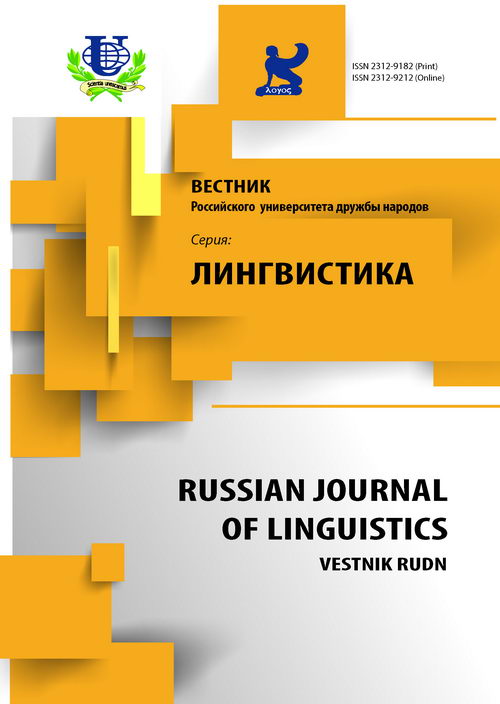Language Choice in Expressing Anger among Arab-English Londoners
- Authors: Dewaele J.1, Qaddourah I.2
-
Affiliations:
- University of London
- University of St Andrews
- Issue: Vol 19, No 4 (2015)
- Pages: 82-100
- Section: Articles
- URL: https://journals.rudn.ru/linguistics/article/view/9260
- ID: 9260
Cite item
Full Text
Abstract
The aim of the present study is to partially replicate the study in Dewaele (2013). We want to determine whether the independent variables linked to the preference of the first (L1) or second language (L2) for the communication of anger among a large heterogeneous group of long-time multilinguals from all over the world (Dewaele 2013) have similar effects in one relatively homogeneous linguistic and cultural group, namely 110 English-speaking Arabs living in London (UK). The analysis of quantitative and qualitative data showed that, in line with the findings in Dewaele (2013), L1 Arabic was preferred over L2 English for expressing anger at oneself, family, friends and at strangers. However, English was preferred to express anger in writing and occasionally in instances of divergence with Arabic-speaking interlocutors (Sachdev, Giles &Pauwels 2013). Frequency of use of English for anger was linked to lower age of onset of L2 learning, naturalistic or mixed L2 learning context, frequency of general use of the L2 and degree of L2 socialization and higher perceived emotionality of English. Gender, age and education were also linked to language choices. Participants explained how their religious beliefs, their cultural and ideological background affect their choice of language for expressing anger.
About the authors
Jean-Marc Dewaele
University of London
Email: j.dewaele@bbk.ac.uk
Birkbeck College
Israa Qaddourah
University of St Andrews
Email: israaqaddourah@gmail.com
References
- Boiger, M., & Mesquita, B. (2012). The construction of emotion in interactions, relationships, and cultures. Emotion Review, 4, 221-229.
- Bond, M.H., & Lai, T.M. (1986). Embarrassment and code-switching into a second language. The Journal of Social Psychology,126, 179-189.
- De Leersnyder, J., Mesquita, B., & Kim, H. (2011). Where do my emotions belong? A study on immigrants' emotional acculturation. Personality & Social Psychology Bulletin, 37, 451-463.
- Dewaele, J.-M. (2004a). The emotional force of swearwords and taboo words in the speech of multilinguals. Journal of Multilingual and Multicultural Development, 25(2/3), 204-222.
- Dewaele, J.-M. (2004b). Blistering barnacles! What language do multilinguals swear in?! Estudios de Sociolinguïstica, 5(1), 83-105.
- Dewaele, J.-M. (2006). Expressing anger in multiple languages. In A. Pavlenko (Ed.), Bilingual minds: Emotional Experience, Expression, and Representation (pp. 118-151). Clevedon: Multilingual Matters.
- Dewaele, J.M. (2008). The emotional weight of ‘I love you’ in multilinguals’ languages. Journal of Pragmatics, 40(10), 1753-1780.
- Dewaele, J.-M. (2010). Christ fucking shit merde! Language preferences for swearing among maximally proficient multilinguals. Sociolinguistic Studies, 4(3), 595-614.
- Dewaele, J.-M. (2011). The differences in self-reported use and perception of the L1 and L2 of maximally proficient bi- and multilinguals: A quantitative and qualitative investigation. International Journal of the Sociology of Language,208, 25-51.
- Dewaele, J.-M. (2013). Emotions in Multiple Languages. Basingstoke: Palgrave Macmillan, 2nd ed.
- Dewaele, J.-M., & Costa, B. (2013). Multilingual clients’ experience of psychotherapy. Language and Psychoanalysis,2(2), 31-50.
- Dewaele, J.-M., & Li Wei (2014a). Intra- and inter-individual variation in self-reported code-switching patterns of adult multilinguals. International Journal of Multilingualism, 11, 225-246.
- Dewaele, J.-M., & Li Wei (2014b). Attitudes towards code-switching among adult mono- and multilingual language users. Journal of Multilingual and Multicultural Development, 35, 235-251.
- Dewaele, J.-M., & Pavlenko, A. (2001-2003). Webquestionnaire Bilingualism and Emotions. University of London.
- Dewaele & Zeckel, I. (to appear). The psychological and linguistic profiles of self-reported code-switchers. International Journal of Bilingualism. doi: 10.1177/1367006915575411
- Dörnyei, Z., & Taguchi, T. (2009). Questionnaires in Second Language Research: Construction, Administration. London: Routledge.
- Ethnicity and National Identity in England and Wales (2011). Office for National Statistics. http://www.ons.gov.uk/ons/rel/census/2011-census/key-statistics-for-local-authorities-in-england-and-wales/rpt-ethnicity.html. Accessed 20/01/2014.
- Güngör, D., Bornstein, M.H., De Leersnyder, J., Cote, L., Ceulemans, E., & Mesquita, B. (2013). Acculturation of personality: A three-culture study of Japanese, Japanese Americans, and European Americans. Journal of Cross-Cultural Psychology, 44(5), 701-718.
- Li, Wei (2007). Dimensions of bilingualism. In Li Wei (Ed.), The Bilingualism Reader (pp. 3-22). London: Routledge, 2nd ed.
- Markus, H., & Kitayama, S. (1991). Culture and self: Implication for cognition, emotion, and motivation. Psychological Review, 98, 224-253.
- Mesquita, B. (2010). Emoting. A contextualized process. In B. Mesquita, L.F. Barrett & E. Smith (Eds.), The mind in context (pp. 83-104). New York: Guilford.
- Miladi, N. (2006). Satellite TV News and the Arab Diaspora in Britain: Comparing Al-Jazeera, the BBC and CNN. Journal of Ethnic and Migration Studies, 32(6), 947-960.
- Othman, M.F.A. (2006). Language Choice among Arabic-English Bilinguals in Manchester, Britain. Unpublished MAdissertation (University of Manchester). Available at: http://languagecontact. humanities.manchester.ac. uk (Last accessed: 9 November, 2013).
- Pavlenko, A. (2004). “Stop doing that, ia komu skazala!”: Language choice and emotions in parent-child communication. Journal of Multilingual and Multicultural Development, 25(2/3), 179-203.
- Pavlenko, A. (2005). Emotions and Multilingualism. Cambridge: Cambridge University Press.
- Pavlenko, A. (2012). Affective processing in bilingual speakers: Disembodied cognition? International Journal of Psychology, 47, 405-428.
- Porte, G. (2012). (ed.) Replication Research in Applied Linguistics. Cambridge: Cambridge University Press.
- Ritchie, W.C., & Bhatia, T.K. (2013). Social and psychological factors in language mixing. In T.K. Bhatia & W.C. Ritchie (Eds.), The Handbook of Bilingualism (pp. 375-390). Chichester, UK: John Wiley & Sons.
- Sachdev, I., Giles, H., & Pauwels, A. (2013). Accommodating multilinguality. In T.K. Bhatia & W.C. Ritchie (Eds.), The Handbook of Bilingualism (pp. 391-416). Chichester, UK: John Wiley & Sons.
- Van Lancker, D., & Cummings, J.L. (1999). Expletives: Neurolinguistic and neurobehavioral perspectives on swearing. Brain Research Reviews,31, 83-104.
- Wierzbicka, A., & Harkins, J. (2001). Introduction. In J. Harkins & A. Wierzbicka (Eds.) Emotions in crosslinguistic perspective (pp. 1-34). Berlin: Mouton De Gruyter.
Supplementary files















